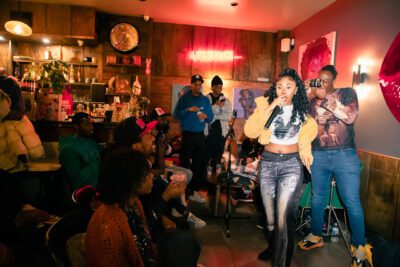Photo illustration by Johansen Peralta
Tanoreen at 25
The mother-daughter duo behind the acclaimed Palestinian restaurant reflect on a quarter century of success — and discuss what's next
Like what you’re hearing? Subscribe to us at iTunes, check us out on Spotify and hear us on Google, Amazon, Stitcher and TuneIn. This is our RSS feed. Tell a friend!
This is hardly a controversial statement or weird hot take, but Tanoreen — the Palestinian staple in Bay Ridge — is one of my top five restaurants in New York City. Maybe top three.
Now in its 25th year, Tanoreen is, of course, a James Beard nominee and a Michelin Bib Gourmand winner. It has spawned two excellent cookbooks — 2014’s “Olives, Lemons & Za’atar” and “Levant” from 2018. It has been featured on Food Network’s “Best Thing I Ever Ate,” and it has been named one of the best restaurants in New York City by Bon Appétit. The accolades are literally nonstop.
So, when I happened to be in Bay Ridge recently, I picked up an inspired chicken shawarma wrap at the takeout window (and a serving of knafeh to heat up at home for dessert). And I invited the mother-daughter team that run Tanoreen to discuss what it takes to be a hit for a quarter century — and to ask them what the next 25 years might look like.
Rawia Bishara, who emigrated here from Nazareth with her family when she was just 18, opened Tanoreen in 1998 once her kids were grown as a way to express her heritage and to honor her mother who taught her how to cook. Rawia’s daughter, Jumana, later left a career in international affairs to come on board as a partner.
“Our food does have something to say about identity and land and culture,” says Jumana. “I always say that Tanoreen is our contribution to the cause because educating people through food is the easiest and most universal way to do it as we know.”
Today the two work closely together on all aspects of daily operation as Rawia looks to hand off the baton in the next five years or so.
“It’s about being traditional and not traditional,” Rawia says. “Innovative, modern, whatever.”
Just about any time you eat at Tanoreen, you’re almost guaranteed to see Jumana at the door or Rawia roaming the floor chatting up very happy customers. Today, we get to be the host.
The following is a transcript of our conversation, which airs as an episode of “Brooklyn Magazine: The Podcast,” edited for clarity and, to a lesser extent, concision.
This is your 25th anniversary, which is really remarkable considering that I read a stat just recently that 80% of New York restaurants close within five years of opening. What do you attribute that success to, that longevity?
Jumana: I attribute it to my mother, but I want to hear what her answer is.
Rawia: Number one, consistency. We stayed the same way we are. Number two, [during] the virus time, we felt the people’s need for takeout food, and we emphasized the takeout food, and we made it cheaper instead of what the other people did and made it more expensive, that stuff, in general. Sandwiches and stuff like that, we knew how to do it. And we are good in keeping customers because we really make a relation with our customers in general. We have customers that’s been coming to Tanoreen since they had their children, and their children went to college and graduated and got married, and they catered food from Tanoreen.
Every time I’ve been, you’re on the floor. You’re talking with customers. There’s a personal touch to everything you guys do.
Raiwa: It matters a lot.
Jumana: The first five years were hard, including 9/11, and between that and just the ups and downs of starting a new business, and the food business itself is difficult. She has a special type of hospitality, and that’s what she alluded to in the latter part of her answers, that people feel like they’re coming home when they’re coming to our restaurant. We want you to come there and feel comfortable and like you’re eating in my mother’s kitchen, which you actually are.
And that goes back to your roots. Chef Rawia, you opened Tanoreen as a way to express your heritage and stay connected to your identity, honor your mother. Is that all accurate?
Rawia: Exactly, all accurate. And another reason is our culture. When I came here, I was 18 years old, and America, to me, was a dream. Anyway, it was really difficult when we first opened. It wasn’t easy. In fact, I took a loan to open. I didn’t even have the money, but I had such a will that I really wanted to have that restaurant. I dreamt about it all the years before because I didn’t like any other job that I did. I’m a person who likes to be her own boss.
Do you like to be other people’s bosses?
Jumana: Yes.
Rawia: Yeah, I do, but at the same time, I don’t really. I feel like they are part of a family. It’s the only restaurant that their employees is with them from the time they opened to now. I have employees for 20 years and 25 years.
You moved from Nazareth, which is where you’re from originally, and you’re 18 when you come here, but you don’t obviously open a restaurant right away. You waited until your kids were in college. You harbored this ambition and desire for a long time. But in 1998, what was Bay Ridge like? It’s among the more conservative, traditional neighborhoods in the borough. It’s historically Italian, Irish.
Rawia: Greeks.
A lot of Greeks. Was there ever any tension in the neighborhood?
Rawia: To tell you the truth, toward me, I never felt anything until 9/11. Nothing. In fact, people were really nice when I came here to the neighborhood, ’74.
The days of “Saturday Night Fever,” although it hadn’t come out yet.
Rawia: Our culture is very close to the Italian and the Greek culture. Where I lived in Nazareth, the way I lived, my family, my mom was a schoolteacher. I did come from a home that was educated. The most important thing was education, and we lived a very nice atmosphere. I did not escape my home. I escaped the country.
You’ve been here obviously much longer than you ever were in Nazareth. What do you remember from growing up there? What do you hold in your heart?
Rawia: If you want, I can sing you three songs to Nazareth. I loved Nazareth growing up, honestly, but after I graduated high school, things were completely different. When I started traveling out of Nazareth, looking for college to find what I want to do in life and all this stuff, I did not like how we lived, and the atmosphere in Palestine, Israel, whatever you want to call it.
We’re talking about the political environment.
Rawia: We’re talking about the political [environment], which can affect a teenager quite a lot. But that was one of the reasons why I left because if I want to have a family, I want my family to live free. That’s the most important thing to me at that time. That is possible here, and I felt it’s possible with my children. So, when I opened, a lot of people from the neighborhood encouraged me. We used to have lines outside the small place before. We were not treated bad at all, but I’ll tell you how we were treated. They’ll ask you, “Where are you from?” And we say, “Palestine.” And they tell you, “Pakistan?” I say, “No, it’s Palestine.” Say, “Oh, yeah, Pakistan.” They’ve never heard of it. Don’t know anything about it.
Do you see it as part of your mission to educate, even if it’s just through food?
Rawia: That’s what I wanted to tell you. That’s why I said the whole story.
Jumana: Then get to the point, Mom!
Rawia: I’m getting to the point. This whole story is to tell you that we were treated very well, but nobody’s familiar with my culture. I felt something is missing.
Jumana: I always say that Tanoreen is our contribution to the cause because educating people through food is the easiest and most universal way to do it as we know.
And the most fun.
Jumana: Everybody enjoys it. Everyone needs it. Whether we’re going to have the conversation or not, being Palestinian is inherently political, so our food does have something to say about identity and land and culture and all of those things that come along with the way that you connect to your people and the way you portray yourself to the outside world. It’s an important part of that. My mom and I do a good job of representing us.
The Middle East is, of course, a very large region. How does one define Middle Eastern cuisine? We can get into your style of Palestinian cooking, but when you look at the umbrella term “Middle Eastern cuisine,” which gets thrown around a lot, applied to you, what does that term mean to you?
Rawia: “Levant,” the second cookbook we did, is really an explanation or an answer to what you’re saying. I brought a dish out of every country in the Middle East around the Mediterranean. That’s what “levant” means, “the sunny place.” We cook okra, Egyptians cook okra, and Syrians cook okra, but each one of us has a different way of cooking the okra.
Jumana: The Levantine region, Palestine, Syria, Jordan, Lebanon cooked the same. The Gulf countries cooked the same, so it’s interesting. In New York City right now, there’s a bunch of Palestinian restaurants that I could name, but I’ve never heard of an Omani restaurant or a Bahrani restaurant. I feel like Arab food is underrepresented. I think the Arab world and its food, there’s still a lot to be explored.
When you arrived in the States, did you have an idea that this was a category of cuisine that was separate?
Rawia: In fact, I didn’t know anything about it because we lived in Israel. We have Israeli passports. We’re Palestinians that stayed in the ‘48 area, and we cook a little different even from the West Bankers. The West Bankers cook like Jordanians because they were with Jordan for a long time. We cook like Lebanese because we were closer to the Lebanese. My mom was unbelievable in spicy food. That’s what made her food different than anybody else’s food.
Jumana: But I think you got exposed more to other kinds of Arab food here in New York.
Rawia: Yeah, here. We were not allowed. We did not have contact with anybody from the Arab countries. We don’t travel there. I was so surprised to get to know Moroccans, Tunisians, the Gulf area. I was shocked. All the time I was thinking that all Arabs are exactly the same, but all of a sudden, you find out that they are the same in religion, they are the same in language, but not culturally [the same] with everything.
Jumana, you were born and raised here. You’re very much Brooklyn. Do you go back? Have you been back?
Jumana: A lot. My parents brought my brother and me back almost every summer as kids, and then when I graduated college here, I moved back there. I got an internship for six months with an NGO that ended up hiring me. I lived in the region for four to five years between Haifa and Ramallah and Nazareth and those places. And then after that, I went to Cairo. I did my master’s at the American University there, so I guess I was in the region for about eight years total.
Did you resist joining your mom in the kitchen, or was that always the goal?
Jumana: It was never the goal. She opened up the restaurant while I was abroad. I remember coming back and helping for the first opening night. It was the first night I ever waited tables in my life, so that was pretty fun. I wanted to actually stay in the development world and work with NGOs and do socioeconomic political stuff, but I came back, and my mom had started something that was looking like it was going to be super successful. It should be, we thought, a family business given how hard it is to run restaurants. She presented me with an opportunity, and I took it.
It’s a beautiful story because Rawia, you learned from your mother, and obviously, you were very close with your parents. The cuisine is the love language. And now, you’re doing it with your daughter. How is working together? I couldn’t imagine being in business with my mother. Is there ever any tension?
Rawia: Everybody, everybody thought that we are going to be fighting from the first month because everybody knows how nice our relation is in the house. But they figured the restaurant is going to make a big fight between us, a big problem. But fortunately, against all odds, we never fought one single time a serious fight about business.
Is there anything that you disagree on, whether it’s an ingredient or a recipe or …
Rawia: Yeah, we disagree. She tells me this needs salt.
Jumana: She always gets the final say. Let’s just be clear, okay?
Rawia: In food, in food. Not in anything else, but in food. In food, I hope she’ll take that place soon. How long can I work? I’ve been on my feet 25 years, and before that, I worked different jobs.
I wonder just in the past decade how the internet and all of these food shows and food blogs and food TikToks have expanded the awareness or changed the perception of different food cultures out there. It’s a very different time, and now everyone wants to be a food influencer. I wonder if you have a thought about that because you obviously started in a different pre-internet era.
Jumana: It’s interesting to see the evolution of that because when we first started getting popular, it was print. New York Magazine published us in their Best Cheap Eats issue. But then as soon as the online thing happened, for Tanoreen, at least, it was fantastic exposure. It’s a no-brainer. Everybody knows what the internet did to the world and our lives, but it’s got its ups and downs. I’m not crazy about everybody being a critic all the time on sites like Yelp and Google. There’s always three sides to a story: There’s ours and the truth. We mostly have good reviews, but I’m just saying that it’s easy these days to take a business down or to take a person down just by getting on the internet and saying some things that may or not be true or exaggerated or dramatic or whatever it is. On the other hand, we are now shipping our food nationwide on Goldbelly because there’s this platform online that does all of the logistics for us to send food from Brooklyn to Washington state and Massachusetts. It’s amazing.
You guys were the lone Palestinian place out there in Bay Ridge for years until Ayat came around in 2020. I wonder if you guys are friends, enemies, frenemies.
Rawia: Ayat [Masoud] used to be my customer. All the time, and she would ask me about recipes.
Jumana: We’re friends.
Rawia: I sent them so many customers when they first opened the place, the grocery store. She’s the daughter of [Halal grocers] Balady, which is the grocery store that’s famous right now in Bay Ridge. But she got my recipes. I gave it to her just like that because I didn’t even know she was going to open a restaurant. All of a sudden, they tell me she opened the place, and she’s doing this. Great, the more the merrier.
That’s a lovely attitude.
Rawia: The more, the better you are. This way there is competition. This way there is encouragement to go ahead to do more so nobody can take your place. You’re number one. You want to stay number one. You don’t want to become number 30 all of a sudden because somebody opened a place. No, I watch. I see what opens. I see what they serve, and all the time, I try to improve. I have a lot of dishes at Tanoreen that I created myself. I did not get it from my mom’s recipes. I can get the base from my mom’s recipe, but, in general, there are many very popular dishes in Tanoreen that I did myself, so that encouraged me.
What’s one that you’re most proud of if someone has never been to Tanoreen?
Rawia: Let’s say eggplant Napoleon.
Jumana: Bestseller. Absolute bestseller since the day she created it.
Rawia: Let’s say the appetizer, musakhan.
Jumana: That is a very quintessentially Palestinian dish. It’s a large piece of taboon bread covered in onions and olive oil and sumac, and then a whole chicken on top of it that’s roasted in all of those things. And you’re supposed to break off the bread and eat the chicken with your hands. The version that we serve at Tanoreen is like a user-friendly format. It looks like a chicken pizza, so it’s chicken with caramelized onions and sumac and toasted almonds on top of a flatbread. It’s delicious.
Rawia: There are things that people don’t expect to find at Tanoreen, like lamb shank.
Jumana: Brussels sprouts.
Rawia: I made that. Brussels sprouts. I see vegetables that we never had in my country, we don’t know anything about, and I make something out of it. I keep trying until it works out. The Brussels sprouts is one of the most popular appetizers.
It sounds like adaptability is key. Innovation is key for staying relevant. Is there ever a tension between innovating and keeping things traditional? You obviously don’t want to stray too far, or is that core to your success is being adaptable and trying to innovate?
Rawia: We don’t have a misunderstanding about that at all. It’s about being traditional and not traditional, innovative, modern, whatever. In fact, I like to take ideas from Jumana and from my son.I get so many ideas from him, like the quinoa. Like the glass noodles, a lot of stuff, he eats it and he introduces me, and I make my own thing with it. But it’s fantastic to be exposed to so many cultures, and New York is the peak in these things. There’s no nationality in the world that doesn’t exist in New York. No food doesn’t exist in New York. It’s the city to be in for something like this, and I love it anyway, but this makes me like it more.
“Rawia” means storyteller. Do you consider yourself a storyteller?
Rawia: Why? You think I talk too much?
Jumana: Yes, she does. You think of yourself as a storyteller through food. Of course, you do.
Rawia: Through food, yes, because I tell them the story how the food came about. There are many stories about how the food came about, how we started cooking certain dishes. Of course, food is one of the most important sides of a culture, like language, like art, like everything else. And if you look into it, it’s unbelievable the stories you read about how the food came about.
Do you source from that region of the world? Does unpredictability or instability in that part of the world affect what happens on your tables, or are you sourcing sort of more locally?
Rawia: There is certain things that I couldn’t find here, like sesame seeds, good sesame seeds. I make my own za’atar. There’s no sesame. There is no za’atar. And I make a macaroni cookie. It’s made with sesame. Half of it is sesame, so I get my sesame from overseas. They ship it to me. I get my za’atar from overseas because I can’t find za’atar here. I get its leaves. They clean it for me, and they send it, and I chop it and make it myself. Sumac, I can’t find a good sumac. Now, lately, we find sumac, but there are certain things you don’t find. But other things that Middle Eastern people are trying to grow vegetables here that’s very similar to the vegetables we eat.
Jumana: There’s a Palestinian guy that has a farm in Pennsylvania that comes by every season or so and brings the things that we would’ve had back home that we can’t get here, like there’s a vegetable called khobeeza — the closest thing to it would be kale. It’s like a green leafy vegetable. He grows it on this farm. He gets these little tiny zucchinis that are like the size of your finger that we hollow out, and fresh mulukhiyah, which is the jute mallow leaves. He comes with these unusual things that our produce guy’s not going to find in the market up in the Bronx, so that’s fantastic. And then we have a cousin who hooks us up every time we ask and we get za’atar, like she said, sesame, sumac, kibbeh spices, shawarma spices, all of these things sent to us quarterly from Nazareth.
How have your customers influenced your menu? And I ask this because I heard a story that when you first moved to New York, you had never had salmon before that wasn’t smoked, but locals here wanted salmon the way they recognize it.
Rawia: Back home we only had smoked salmon. But fresh? We got it here, and I liked it. And I found a way to cook it, too. I don’t like to eat it by itself. Too strong for me, the fish, so I ended up with sliced artichoke hearts with basil, garlic, fresh tomato. I sauté, and I put it around the salmon, and we roast the salmon. And people love the combination of artichoke and salmon to a degree where I can’t change the part of the recipe anymore. When I try, they say, “Oh, no, no, no. We want the one with artichoke.” They adapt, and I adapt.
Jumana, what does your name mean?
Jumana: I’ve heard two things, black pearl and precious stone.
Rawia: And in fact, she just got engaged, and she got engaged with a black pearl.
Oh, congratulations. Mazel tov!
Rawia: You speak Hebrew, man?
Well, no.
Rawia: When you said mazel tov, I figured.
Jumana: Everybody says mazel tov.
Rawia: I speak Hebrew. I wanted to talk to you. Jumana doesn’t understand.
I wish I did, but I don’t. I have a couple expressions that my dad handed down and my grandmother, but that’s about it.
Jumana: My parents used to speak Hebrew to each other when they didn’t want me and my brother to understand when we were little.
Rawia: It’s an easy language. It’s very similar to Arabic.
You said, when we were talking about how you were received, that there was never an issue. But it sounds like around 9/11, it was different. What happened around then?
Rawia: Number one, everybody passed by me to tell me to put the flag up and not to put Arabic music on. And I didn’t. I put Arabic music on the way I always did. I told my help, ” You did not do anything wrong. You are not supposed to let anybody make you feel that way. It’s not your fault. You don’t have to feel the guilt. Stay out of it. Do your job and be nice, and if somebody talks to you, avoid it.” But when somebody comes to me buying a sandwich — and it’s $4 he gave me — and he asked me, “Is this money going to Bin Laden?” I threw the money in his face, and I said, “You can have the sandwich. I don’t want your money, period.”
Jumana: I don’t think we have to go that far back for ignorance, actually. I got a similar comment last month at the restaurant. There was a group of gentlemen having lunch or dinner, and one of them was taking leftovers to go. And I went by to talk to the table, see how everything was, and he goes, “I’m taking leftovers on the plane with me. I hope they don’t think I’m a terrorist.” I just looked at him and didn’t say anything and then walked away because I knew someone at the table, and I didn’t want to make a scene.
It’s just an incredibly stupid and ignorant thing to say, but it does sound like it was not coming from a malicious place, but still very uninformed and clueless.
Jumana: In response to your question, there was nothing really malicious to us intentionally, but there’s a lot of backhanded, ignorant, like you said, uninformed opinions and things that people say that really are not meant to harm us personally, but you can’t help but be offended because this is our culture that we’re talking about.
Rawia: And the business got weaker for a while. Even though my real customers that had been there for a few years before, they still came to encourage me, but there are people that stopped coming. Many waiters in Manhattan got fired, and they came to me looking for a job.
What’s the next 25 years for Tanoreen?
Rawia [puts her arm around Jumana]: This. This is the next 25 years. I’ll stay with her for another five years, but after five years, all hers.
Do you want it?
Rawia: She’s inheriting something really fantastic, and she knows that.
Jumana: Of course, I do. It’s a familial and cultural legacy at this point, and I’m going to keep it going for as long as I can.
Check out this episode of “Brooklyn Magazine: The Podcast” for more. Subscribe and listen wherever you get your podcasts.
You might also like 


























